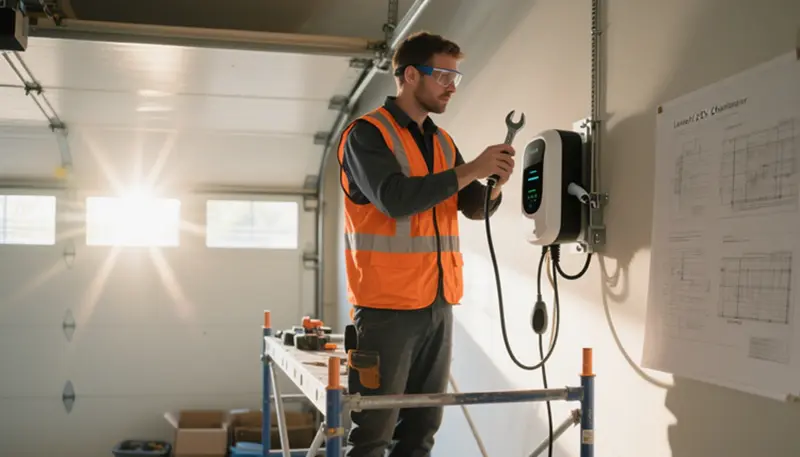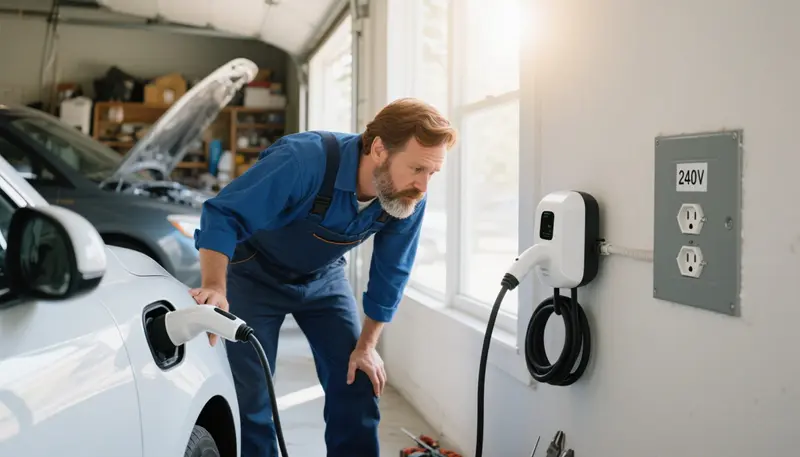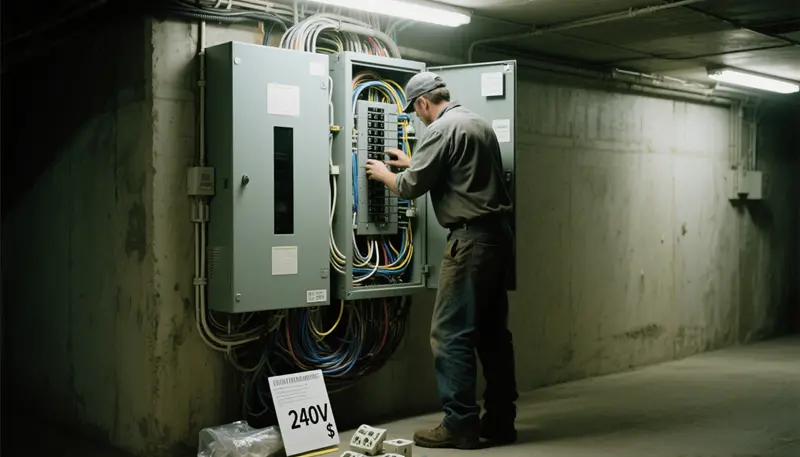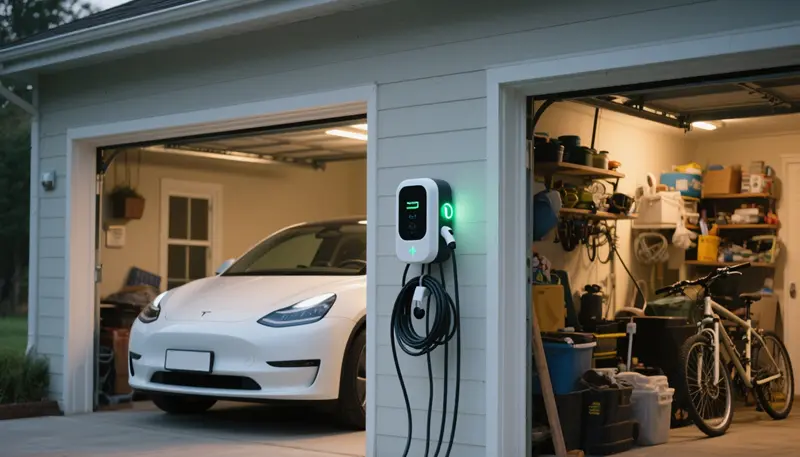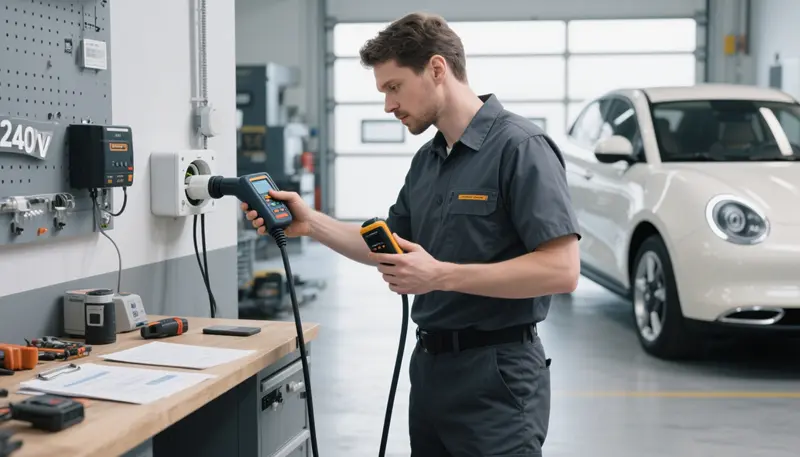Blog
Commercial Level 2 EV Charger: Best Installation Guide for Businesses
Introduction to Commercial EV Charger Installation
As electric vehicles (EVs) surge in popularity across the U.S. and Europe, businesses are increasingly recognizing the value of offering EV charging solutions. Installing a commercial level 2 EV charger is a strategic move for companies looking to attract eco-conscious customers, support employees, and enhance property value. Whether you operate a retail center, office building, hotel, or apartment complex, commercial EV charger installation provides a competitive edge in today’s sustainability-driven market. This comprehensive guide explores the benefits, technical requirements, costs, and best practices for installing the best commercial level 2 EV charger, helping businesses make informed decisions about commercial electric car charging points installation.
This article addresses key questions about commercial level 2 EV chargers, including how to choose the right equipment, navigate the installation process, and maximize return on investment (ROI). With actionable insights and expert recommendations, we’ll guide you through every step of implementing commercial EV charger installation to meet the needs of your business and customers.
Why Businesses Need Commercial Level 2 EV Chargers
The Growing Demand for EV Charging
The EV market is booming, with millions of electric vehicles on U.S. and European roads in 2025. According to the International Energy Agency (IEA), global EV sales are projected to reach 18 million by 2030, with significant growth in North America and Europe. As EV adoption rises, businesses that offer commercial electric car charging points installation can attract a growing demographic of environmentally conscious consumers and employees.
Benefits of Installing Commercial Level 2 EV Chargers
- Attract Customers: Retail centers, restaurants, and hotels with commercial level 2 EV chargers can draw EV drivers who prefer to shop or dine where they can charge their vehicles.
- Support Employees: Offering workplace charging demonstrates a commitment to sustainability and employee satisfaction, especially for those with long commutes.
- Increase Property Value: For property managers and landlords, commercial EV charger installation enhances the appeal of commercial and multi-family properties, potentially increasing rental rates.
- Revenue Opportunities: Businesses can monetize chargers through pay-per-use models or subscription services, creating a new income stream.
- Sustainability Goals: Installing commercial electric car charging points aligns with corporate social responsibility (CSR) initiatives and reduces carbon footprints.
Why Level 2 Over DC Fast Chargers?
While DC fast chargers offer rapid charging, they are costly and require significant electrical infrastructure, making them less practical for most commercial settings. A commercial level 2 EV charger (240 volts, 7-19 kW) provides a balanced solution, delivering 20-50 miles of range per hour at a fraction of the cost. This makes Level 2 chargers ideal for workplaces, retail, and hospitality settings where vehicles are parked for extended periods.
Features and Advantages of Commercial Level 2 EV Chargers
What Is a Commercial Level 2 EV Charger?
A commercial level 2 EV charger operates on a 240-volt circuit, delivering 7-19 kW of power, depending on the charger’s amperage (typically 32-80 amps). Unlike Level 1 chargers (120 volts, 3-5 miles per hour), Level 2 chargers are fast enough to support multiple EVs daily, making them perfect for commercial environments. Key features include:
- Charging Speed: Adds 20-50 miles of range per hour, ideal for customers or employees parked for 1-4 hours.
- Compatibility: Supports most EVs with J1772 or Tesla connectors (via adapters).
- Smart Features: Many models offer Wi-Fi connectivity, remote monitoring, payment systems, and load management to optimize energy use.
- Durability: Designed for high-traffic environments with weatherproof enclosures (e.g.,👉 FlagTools Commercial EV Charger) and vandal-resistant designs.
Advantages for Businesses
- Cost-Effective: Compared to DC fast chargers ($10,000-$50,000), Level 2 chargers cost $1,000-$5,000 per unit, with lower installation expenses.
- Scalability: Businesses can install multiple commercial level 2 EV chargers to serve several vehicles simultaneously without overloading electrical systems.
- User-Friendly: Smart chargers allow businesses to set pricing, track usage, and integrate with apps for seamless customer experiences.
- Compliance: Meets accessibility standards like the Americans with Disabilities Act (ADA) when installed correctly.
Top Brands for the Best Commercial Level 2 EV Charger
When choosing the best commercial level 2 EV charger, consider these leading brands:
- ChargePoint: Known for its cloud-based management system, allowing businesses to monitor usage, set pricing, and generate reports.
- FLO: Offers rugged chargers designed for extreme weather, ideal for outdoor installations in Europe or northern U.S. states.
- EVBox: Provides modular designs for easy scalability and maintenance, popular in European markets.
- Blink Charging: Affordable options with robust payment integration for retail and hospitality settings.
- Tesla Destination Charger: Tailored for Tesla-heavy markets but compatible with other EVs via adapters.
- FlagTools Commercial Edition: Offers unbeatable value with 11KW/22KW flexible power, CE/UL-certified for EU/NA markets. Featuring IP65-rated safety, military-grade protection, and ultra-durable TPU jacket (-30°C to +50°C resistant), plus smart app control and universal compatibility—perfect for cost-effective commercial charging worldwide.
These brands excel in reliability, user experience, and smart features, making them top choices for commercial EV charger installation.
Steps for Commercial EV Charger Installation
Step 1: Site Assessment
Before installing commercial electric car charging points, conduct a thorough site evaluation:
- Location: Choose high-traffic, visible areas like parking lot entrances or near building entrances, ensuring ADA compliance (e.g., accessible parking spaces).
- Power Availability: Assess the electrical panel’s capacity (typically 200-400 amps for commercial properties). A licensed electrician can determine if upgrades are needed.
- Number of Chargers: Estimate demand based on customer or employee EV usage. Start with 2-4 chargers and scale up as needed.
Step 2: Select the Right Charger
Choose a commercial level 2 EV charger based on:
- Power Output: 7.2 kW (32 amps) for standard use; 11-19 kW (48-80 amps) for faster charging.
- Smart Features: Prioritize chargers with remote monitoring, payment systems, and load balancing to prevent grid overload.
- Durability: Opt for weatherproof, vandal-resistant models for outdoor installations.
Step 3: Engage a Licensed Electrician
Hire a certified electrician experienced in commercial EV charger installation. They will:
- Install dedicated 240-volt circuits (40-80 amps per charger).
- Ensure compliance with the National Electrical Code (NEC) Article 625 and local regulations.
- Coordinate with utilities for any required electrical upgrades.
Step 4: Obtain Permits and Approvals
Most jurisdictions require permits for commercial electric car charging points installation. Your electrician or contractor will:
- Submit electrical plans to the local building department.
- Ensure compliance with accessibility and safety standards (e.g., ADA, European Accessibility Act).
- Coordinate inspections post-installation.
- Learn more about “How to Apply for a Permit to Install an EV Charger”.
Step 5: Installation and Testing
The installation process typically takes 1-3 days per charger, depending on complexity:
- Mount chargers on pedestals or walls, ensuring weatherproofing for outdoor units.
- Run conduit and wiring from the electrical panel to the charger location.
- Test chargers for functionality, safety, and connectivity (e.g., Wi-Fi or payment systems)
- Train staff on charger operation and maintenance.
How to Choose the Best Commercial Level 2 EV Charger
Key Factors to Consider
Selecting the best commercial level 2 EV charger requires balancing performance, cost, and functionality:
Power Output: Choose 7.2-11 kW for standard commercial use or 19 kW for high-demand settings like malls or hotels.
Smart Features: Look for chargers with:
- Cloud-based management for usage tracking and billing.
- Load balancing to distribute power across multiple chargers.
- Mobile app integration for user convenience.
Durability: Ensure chargers are rated for outdoor use (e.g., IP65 or NEMA 4) and resistant to vandalism.
Scalability: Opt for modular systems that allow easy addition of chargers as demand grows.
Warranty and Support: Choose brands with 2-5 year warranties and responsive customer support.
Brand comparison
- ChargePoint CP6000: Offers robust cloud management, ideal for retail and office settings. Price: $2,000-$4,000 per unit.
- FLO Core+: Built for harsh climates, with excellent durability for outdoor installations. Price: $1,500-$3,500.
- EVBox BusinessLine: Scalable and user-friendly, popular in Europe for multi-unit installations. Price: $2,500-$5,000.
- Blink IQ 200: Affordable with integrated payment systems, great for small businesses. Price: $1,200-$2,500.
- FlagTools-22KW Commercial Edition: Delivers unbeatable value with 11KW/22KW flexible power, smart app control, IP65 military-grade safety, universal compatibility, and durable oxygen-free copper cables—perfect for budget-conscious commercial charging. Price: Under $500. (View detailed specifications👈)
Working with Professionals
Partner with a certified installer to ensure the best commercial level 2 EV charger meets your needs. They can recommend models based on your budget, electrical capacity, and user demographics. Verify that installers are licensed, insured, and experienced in commercial EV charger installation.
Costs and Incentives for Commercial EV Charger Installation
Cost Breakdown
The cost of commercial EV charger installation varies based on equipment, labor, and infrastructure:
Equipment Costs:
- Commercial level 2 EV charger: $500-$5,000 per unit, depending on brand and features.
- Dual-port chargers (serving two vehicles): $2,500-$7,000.
Installation Costs:
- Basic installation (wiring, mounting): $500-$2,500 per charger.
- Complex installations (long conduit runs, panel upgrades): $2,500-$5,000+.
Electrical Upgrades:
- Panel upgrades (e.g., 200 to 400 amps): $5,000-$15,000.
- Transformer upgrades (rare for Level 2): $10,000-$20,000.
Permits and Fees:
- Permits: $100-$500 per charger.
- Inspection fees: $200-$1,000.
Total costs typically range from $2,000-$10,000 per commercial level 2 EV charger, with multi-unit installations scaling proportionally.
Incentives and Rebates
United States:
- Federal Tax Credit: The Alternative Fuel Infrastructure Tax Credit offers up to 30% of costs (capped at $100,000 for commercial installations as of 2025).
- State Programs: California’s CALeVIP provides rebates up to $7,000 per charger. Other states like New York and Massachusetts offer similar incentives.
- Utility Rebates: Companies like PG&E and ConEd offer rebates or discounted rates for commercial electric car charging points installation.
Europe:
- EU Funding: Programs like the Connecting Europe Facility (CEF) support EV charging infrastructure, with grants for businesses in countries like Germany and France.
- National Incentives: The UK’s Workplace Charging Scheme offers up to £14,000 per business for charger installations. Norway and the Netherlands provide tax breaks for commercial EV charger installation.
- How to Apply: Work with your electrician or charger vendor to identify and apply for incentives, which can offset 20-50% of costs.
Return on Investment (ROI)
- Direct Revenue: Charge users per kWh or session (e.g., $1-$3 per hour), generating steady income.
- Indirect Benefits: Attract more customers, increase dwell time (e.g., at retail centers), and enhance brand reputation.
- Break-Even Timeline: With incentives and moderate usage, businesses can recoup costs in 2-5 years, depending on charging fees and foot traffic.
Frequently Asked Questions (FAQ)
Q: How long does it take to install a commercial level 2 EV charger?
A: Installation typically takes 1-3 days per charger, depending on electrical complexity. Panel upgrades or multiple chargers may extend the timeline to 1-2 weeks.
Q: How many commercial level 2 EV chargers should my business install?
A: Start with 2-4 chargers for small businesses or 4-10 for larger properties like malls or office parks. Assess demand based on EV adoption in your area.
Q: What is the best commercial level 2 EV charger for my business?
A: The best commercial level 2 EV charger depends on your needs. FlagTools is ideal for its excellent performance and high cost performance, ChargePoint is ideal for smart features, FLO for durability, and EVBox for scalability.
Q: Do I need permits for commercial EV charger installation?
A: Yes, most jurisdictions require electrical and building permits for commercial electric car charging points installation. Your electrician will handle the process.
Q: Can I charge customers for using my commercial level 2 EV charger?
A: Yes, many chargers support payment systems, allowing you to set per-kWh or per-session fees.
Q: How do I maintain commercial electric car charging points?
A: Regular maintenance includes cleaning, software updates, and inspecting cables for wear. Most brands offer maintenance plans or support contracts.
Conclusion: Power Your Business with Commercial Level 2 EV Chargers
Installing a commercial level 2 EV charger is a forward-thinking investment that positions your business as a leader in sustainability and customer convenience. By offering commercial electric car charging points, you can attract EV-driving customers, support employees, and enhance your property’s value while contributing to a greener future. With the right planning, equipment, and professional installation, commercial EV charger installation can deliver both immediate benefits and long-term ROI.
Call to Action: Ready to electrify your business? Contact a certified commercial EV charger installation professional to assess your site and get quotes for the best commercial level 2 EV charger. Explore incentives and start building your EV charging infrastructure today!



